Belarusian attack
The seniority was established 16 May 1803, when in he. Yekaterinopol and Zvenigorodka, the regiment chief-in-chief, Major General Count P. V. Golenishchev-Kutuzov, formed the Belarusian Hussars' Regiment - from hussar regiments of Olviopolsky, Yelisavetgrad, Pavlograd and Alexandria, which separated two squadrons.
In 1805, the Byelorussian regiment distinguished itself in Moldavia - in the Russian-Turkish theater of operations, conducting dashing affairs near Bucharest, Turbat, Zhurzhey, and Izmail. October 10 1809 in the battle of the Tartar regiment attacked the superior forces of the Turks, overturned the enemy and took two flags. Led by the new chief, Major General Ya. P. Kulnev, the 5 regiment of May 1810 crossed the Danube and took an active part in the battle of Shumla, in the capture of Nikopol and Rushchuk. September 17 The Belarusian hussars who acted as part of the Danube army distinguished themselves in the battle of Luboml. In the 1812 campaign, the regiment participated in the battles of Lützen, Bautzen and Leipzig. Especially the regiment distinguished itself under Katsbach - where a dashing attack together with the Akhtyr hussars under the personal command of their chief, Major General S. N. Lansky, overturned the French cavalry and crushed the infantry of the enemy’s left flank - for which he was awarded the signs on the caps with the inscription: 1813 August 14 of the Year. " In 1813, the regiment distinguished itself in the battle of Fere-Champenoise. For participation in 1814-1812 campaigns. 1814 silver pipes were presented to the regiment with the inscription: “To the Belarusian Hussars, which is now the Prince of Orange, for excellent courage and bravery in the memorable 22 campaign of the year rendered.” We are talking about the regimental chef from 1814 in March 5, Prince of Orange (the future king of the Netherlands Willem II).
In the campaign 1828 - 29. The regiment distinguished itself under Silistra and Shumla. In the battle at Kulch 30 in May 1829, the Belarusian hussars as part of the 1 brigade of the 2 hussar division supported the infantry with their courageous attacks and made it possible for the horse artillery, which had jumped to the aid, to turn the Turks to flight. For this brilliant business and for the differences in this Russian-Turkish war, the regiment received 22 St. George pipes with inscriptions: "For the difference in the Turkish war 1829 of the year."
In 1831, the regiment was part of the troops subduing the Polish uprising, and in 1849, the Belarusian hussars took part in military actions against the Hungarians - distinguished themselves in the battle near Debrechin. In memory of this difference, after the death of the King of the Netherlands, Austrian Field Marshal Count Y. Radetsky was appointed the regiment's chief, and in the rescript of his name, the Emperor Nicholas I called the Byelorussian regiment “the bravest in my cavalry”. The regiment became known as the Hussar Field Marshal gr. Radetzky, and 19 March 1854, the name “Belarusian” was added to this name.
In the Crimean War 1853-56. the regiment was moved to the Danube and participated in the battle of Tohhaverdo-Kagarlyk (19 June 1854 g.). 1 January 1858 Mr. Mikhail Nikolaevich was appointed chief of the regiment, and March 25 the 1864 regiment received the number 7.
In the Russian-Turkish war 1877-78's. The regiment particularly distinguished itself in the battles of Hadji Oglu Bazardzhik (14 of September 1877 and 10 of January 1878) and in the battle of Varna-Pravody (14 of January of 1878). For this campaign, the regiment was awarded the St. George standard with the inscription: “For the difference in the Turkish war of 1877-78”, to which in 1903 (on the day of the 100 anniversary anniversary of the regiment) was added the inscription “1803-1903” and awarded the Alexander Jubilee tape. The same inscription: "1803-1903" added to the St. George's ribbons.
18 August 1882 regiment was renamed 21 th dragoon, and 6 December 1907 regiment was returned name: 7 th Hussars Belorussian E. I.V. Vel. Prince Mikhail Nikolaevich regiment. After the death of the Augusteys Chef, 1909, the regiment began to be called the 7 Hussars of Belarus. Finally, on the milestone day of the 100th anniversary of the Patriotic War, the Highest Order of 26 in August 1912 “in return for excellent courage and bravery in the battles of World War II”, the regiment was ordered to be called the 7 of Belarus Hussar by Alexander I regiment.
Private 7 hussar regiment in full uniform. Postcard P. V. Robike.
Such is in short the glorious story Belarusian hussars. And a new page of their glory opened the Second World War - the Great War 1914 - 1917.
2 August 1914 Belarusian hussars commanded by Colonel P.I. Sukovkin attacked the Hungarian cavalry under Stoyanov. And 15 August 1914 in the fields of Volyn, Vasilkov 3 th squadron of the regiment attacked the Austrian battery and infantry in the equestrian formation - chopping more of the enemy battalion. For this case, the wounded commander of the squadron Captain A. A. Vyazmitinov personally the Emperor was awarded the Order of St. George 4 degree, and the entire combat personnel of the squadron received the St. George 4 degree.
3 June 1916 the following significant case of the Belarusian hussars happened - and we would like to tell about it in more detail.
The offensive of the South-Western Front was under way, and the 7-I cavalry division under the command of Lieutenant-General F. S. Rerberg went behind the advancing infantry with reinforced gaits — moving from the right flank to the left.
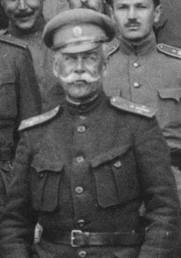
F. S. Rerberg.
By 15-16 hours, passing between Myshlini and Novoselki from the colony Olgin, Belarusian hussars and Cossacks of the 11 Don Cossack Regiment went into the valley south-east of der. Zvinyache.
The advance of the infantry stopped, and the troops stretched out. At this time, the enemy, pulling up a fresh Hungarian division, twisted the left flank of the Russians south of vil. By two infantry regiments. Thoughts - with the intention to take advantage of the natural gap between the parts. Over the hills of rough terrain in the direction of the village of Myslina - stake Kupovets went heavy infantry battle - and the left flank of the Russian infantry, more and more increased the gap with its neighbors.
F. S. Rerberg issued an order: “Belarusian hussars in the equestrian ranks attack the enemy’s advancing infantry and straighten out the situation. Confident in success. 11-th Don regiment to be in combat reserve. "
The commander of the Byelorussians, Colonel N. P. Serebrennikov, leaving with him the standard and a platoon of the 1 squadron, drove off over the hill, ordering Colonel G. Zubov, the senior head officer of the regiment, to lead the regiment to the attack. Snatching a sword from the scabbard, G. N. Zubov held out in front of the regiment.
Having built a full front "half-squadron on infantry", the Belarusians rushed forward - and after the next knoll they came into the attacking dense chains of the Hungarians, crushed them and, after hurricane passing three lines of chains, began to turn back - the trumpeters were already jumping from the head of the division, trumpeting .
1-th, 2-th and part of 4-th squadron turned right-back, collecting prisoners.
Lieutenant I. I. Zamkovsky, collecting the remnants of the left-flank 3 squadron, which suffered relatively large losses from machine-gun fire, and part of the hussars of the neighboring 4 squadron, turned left and back and led the hussars to the enemy guns still firing from Elizarov. Here the squadron’s losses were high, the lieutenant I. I. Znajkovsky was wounded, but the machine guns were silenced — their calculations and cover were chopped up and thickened. This enabled the entire regiment to avoid further losses and collect prisoners.
The battlefield was left for the Byelorussians, and the Hungarian infantry (or rather its remnants) fled to the north. At first they steadfastly resisted, but could not withstand the rapid attack. Part of the Hungarian infantry, which was pressing against the left flank of the Russian infantry, began to retreat.
Thus, the breakthrough and detour from the fresh infantry formation of the enemy were eliminated by the 500 Russian hussars who took more 2500 prisoners. In addition, the Hungarian infantry lost 1600 people killed and wounded.
The summary of the Supreme Commander's Headquarters was noted: “Belarusian hussars dashing horse attack attacked the enemy’s infantry and destroyed the 1 and 11 regiments of the Hungarian Honed, eliminating the breakthrough and capturing a significant number of prisoners.”
After the battle, the 3 th squadron of the Byelorussians was reduced to one and a half platoons (and half a squadron was urgently requested) - but it was his second attack on the machine guns that made it possible to change the course of the fight. The officers were awarded orders and orders, and the lower ranks received St. George's crosses.
What is unique about this fight?
First, we see a cavalry attack not against a battered or retreating enemy, but against deployed and advancing infantry performing a serious maneuver. The Hungarian infantry is qualitatively equivalent to the best German units. And this infantry was not only defeated by cavalrymen - it suffered the hardest losses, many times more than the number of hussars.
Secondly, the cavalry dealt a blow to the enemy’s machine guns against it - and, despite the losses, it emerged victorious from this fight.
Thirdly, the hussars decided the fate of an important battle - having parried a promising maneuver from the side of a fresh mix of the enemy. The terrain (bumps) in this case favored the actions of cavalrymen - hiding them from the eyes of the enemy and allowing them to reach tactical surprise.
The 7 th hussar Belarusian regiment later took part in the 1917 Summer Offensive of the Year, and then, as part of the 7 Cavalry Division and Consolidated Corps, covered the retreat of the Russian units.
Courage, audacity in battle and tactical literacy - this is what the hussars of the 7 Belarusian Regiment, one of the many army regiments of the Russian cavalry, demonstrated during the Great War - inscribing new laurels in the history of their native unit.
"Three Musketeers". Hussars of the 7 regiment in light blue dolmans pose with bare bombs.
Col. E. K. Miller, Commander of the 7 Hussars in December 1907 - August 1909. During the Great War, Lieutenant-General Miller — P. A. Plehve, a cavalry general's comrade-in-arms and one of the most talented staff officers of the Russian Army, the chief of staff of the 5 and 12 armies. During the Civil War - the Chief of the Northern Territory. In emigration, the chairman of the Association of Officers of the 7 Hussar Regiment, and since January 27 1930 (after the abduction of A. I. Kutepov) accepted the duties of the EMRO Chairman. In September, 1937 was kidnapped by Soviet agents, and in 1939, he died in Moscow.
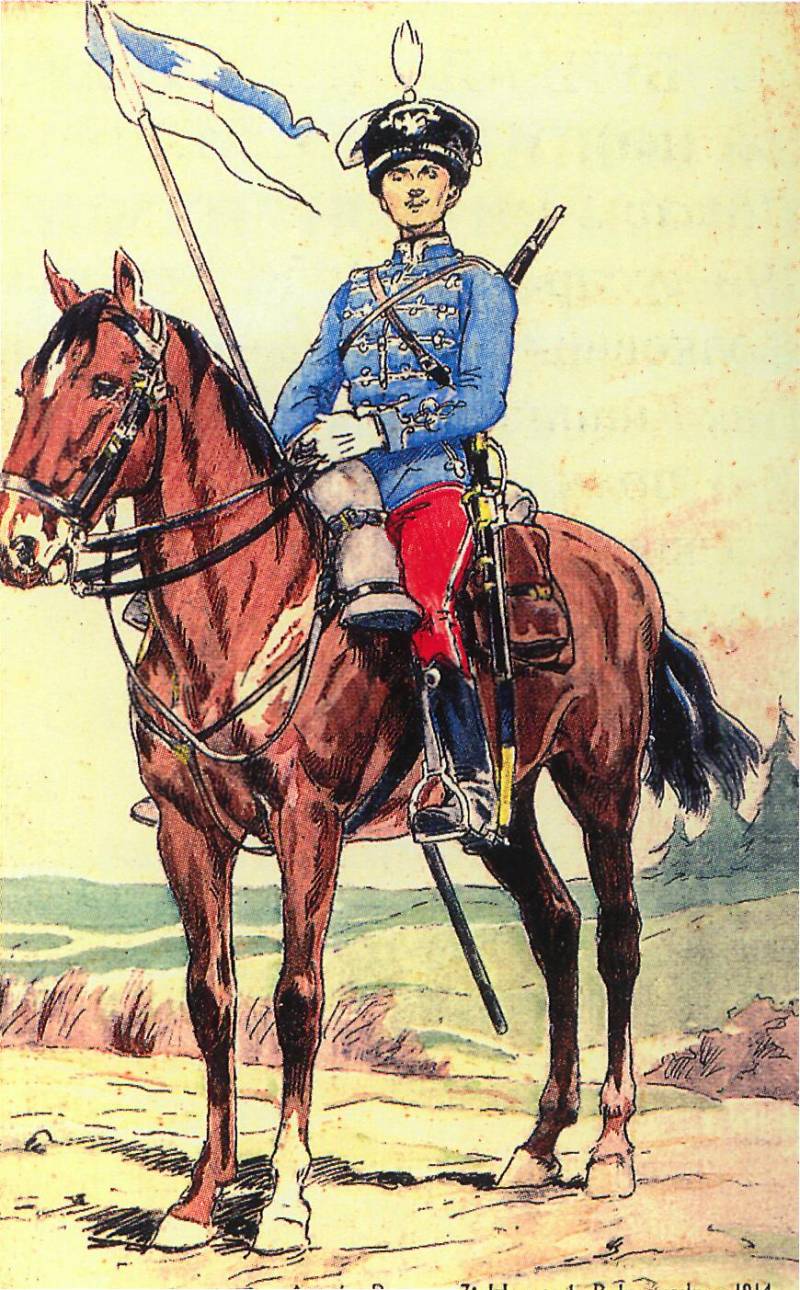
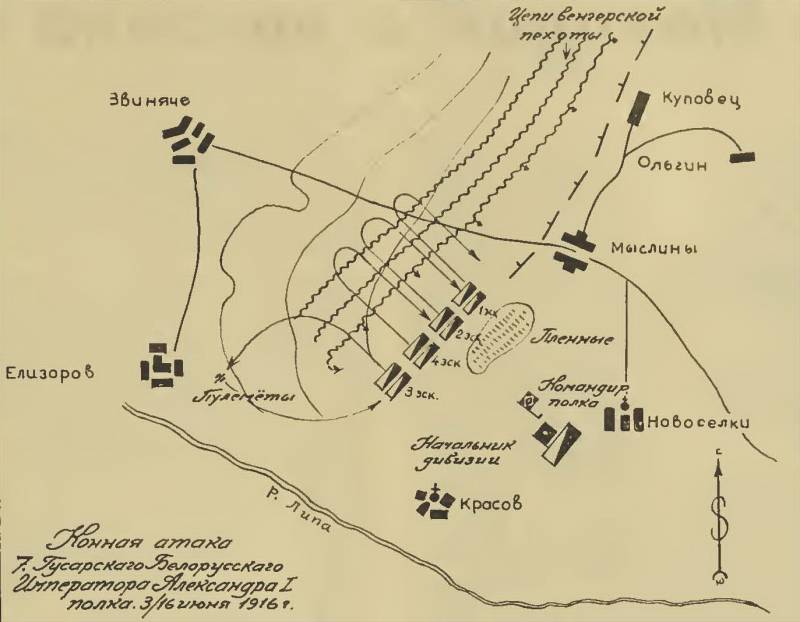
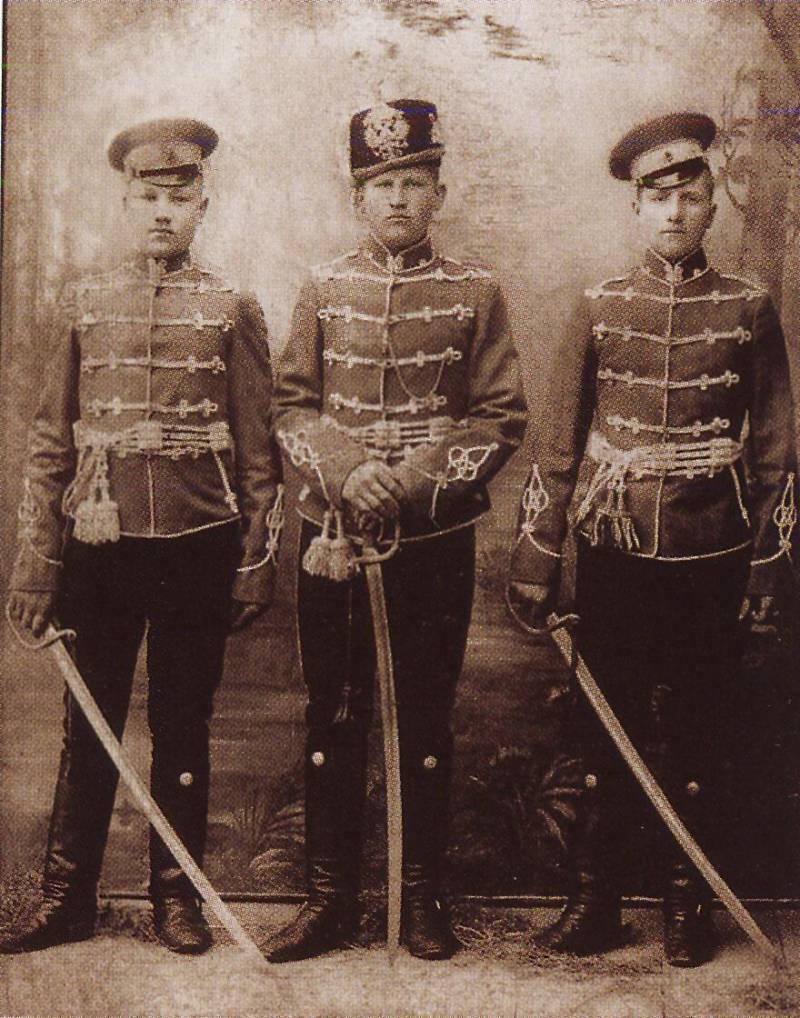
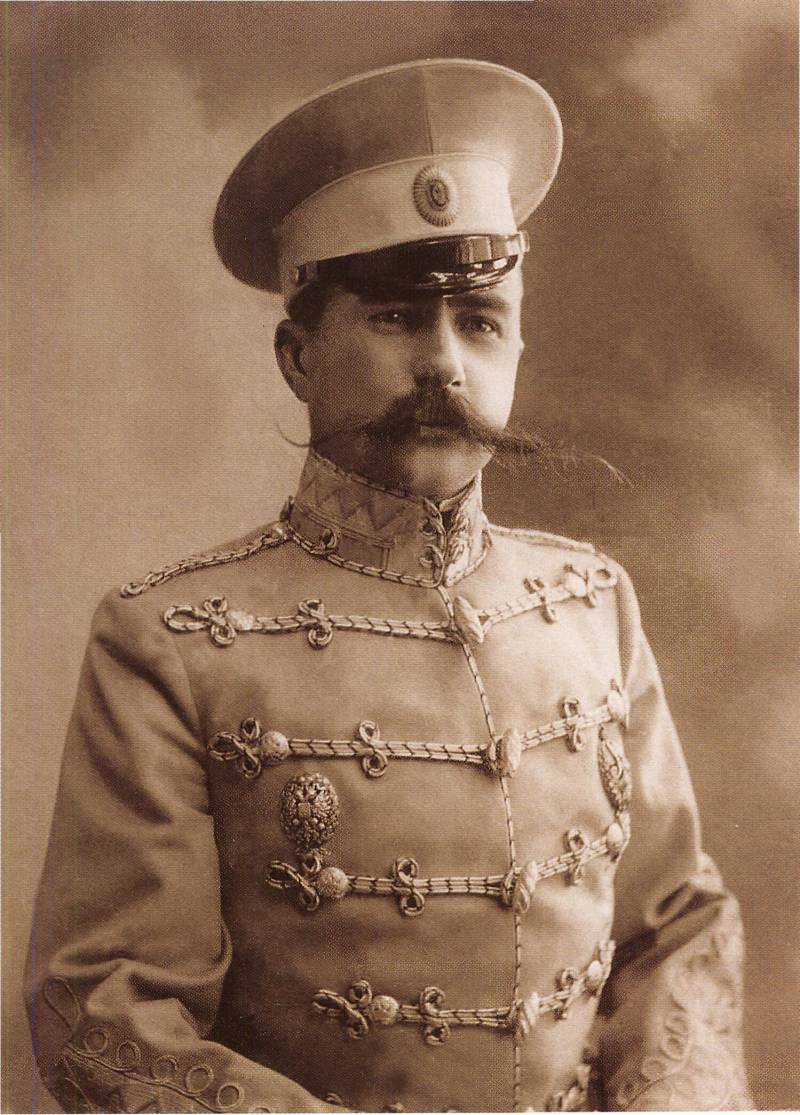
Information